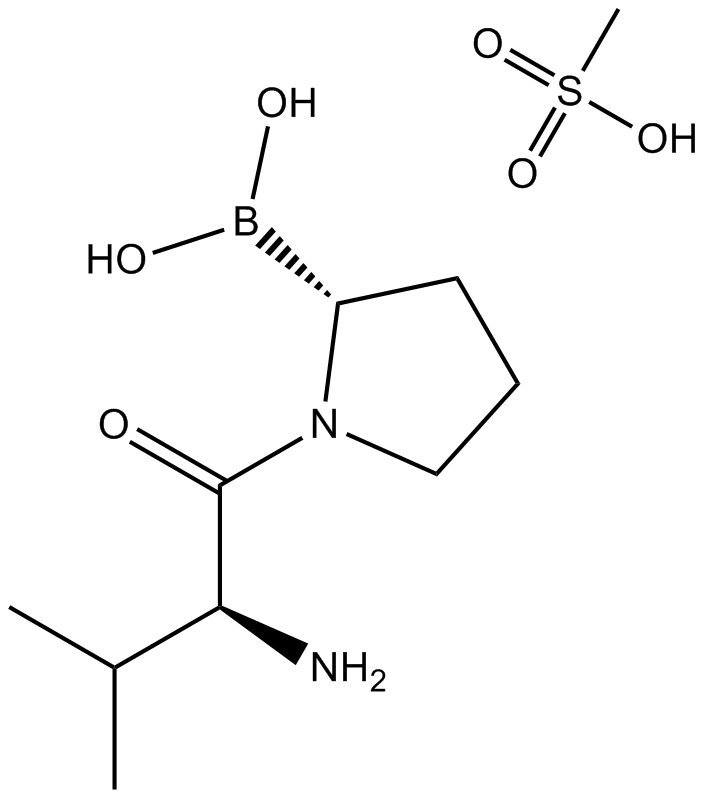Talabostat mesylate (Synonyms: Val-boro-Pro) |
| Catalog No.GC10018 |
Le mésylate de talabostat (mésylate de Val-boroPro; mésylate de PT100) est un inhibiteur de la dipeptidyl peptidase IV (DPP-IV) actif par voie orale et non sélectif (IC50<4nM; Ki = 0,18nM) et le premier inhibiteur clinique de la protéine d'activation des fibroblastes (FAP) ( IC50 = 560 nM), inhibe DPP8/9 (IC50 = 4/11 nM ; Ki = 1,5/0,76 nM), la proline dipeptidase cellulaire quiescente (QPP) (IC50 = 310 nM), DPP2 et certaines autres enzymes de la famille DASH.
Products are for research use only. Not for human use. We do not sell to patients.

Cas No.: 150080-09-4
Sample solution is provided at 25 µL, 10mM.
Talabostat (PT100) is an orally active and non-selective inhibitor of dipeptidyl peptidase IV (DPP-IV) (IC50 < 4 nM; Ki = 0.18 nM) and the first clinical inhibitor of fibroblast activation protein (FAP) (IC50= 560 nM), inhibiting DPP 8/9 (IC50= 4/11 nM; Ki = 1.5/0.76 nM), prolyl endopeptidase (QPP) (IC50= 310 nM), DPP2, and other DASH family enzymes[1]. Due to its inhibitory action on these proteases, the mechanism of action of Talabostat (PT100) involves the inhibition of protease activity, thereby affecting the tumor microenvironment, immune cell activity, and inflammatory responses[2]. Talabostat (PT100) is also known to stimulate hematopoiesis.
In vitro, Talabostat (PT100) at concentrations ranging from 30 pg/ml to 30 μg/ml when added to the culture medium, can induce tumor regression and rejection in WEHI 164 fibrosarcoma and EL 4 and A20/2 J lymphoma models[1]. Talabostat (PT100) (2μM, 24h) can induce the active form of caspase-1, which can efficiently cleave substrates mediating pyroptosis but not effectively cleave IL-1β or the tetrapeptide Ac-WEHD-AFC[4]. In tumors and tumor-draining lymph nodes, Talabostat (PT100) stimulates the transcriptional upregulation of various cytokines such as IL-1β, IL-6, G-CSF, and CXCL1/KC[4].
In vivo, Talabostat (PT100) significantly inhibits the extraneous growth of tumors such as B16-F10, WEHI 164, and EL 4 tumor cells in mice through delayed oral administration (5–40 μg, twice daily, approximately 8 hours apart) [3].
References:
[1] Connolly BA, et al. Dipeptide boronic acid inhibitors of dipeptidyl peptidase IV: determinants of potencyand in vivo efficacy and safety. J Med Chem. 2008 Oct 9;51(19):6005-13.
[2] Lankas GR, et al. Dipeptidyl peptidase IV inhibition for the treatment of type 2 diabetes: potential importance of selectivity over dipeptidyl peptidases 8 and 9. Diabetes. 2005 Oct;54(10):2988-94.
[3] Adams S, et al. PT-100, a small molecule dipeptidyl peptidase inhibitor, has potent antitumor effects and augments antibody-mediated cytotoxicity via a novel immune mechanism. Cancer Res. 2004 Aug 1;64(15):5471-80.
[4] Okondo M C , Johnson D C , Sridharan R ,et al.DPP8 and DPP9 inhibition induces pro-caspase-1-dependent monocyte and macrophage pyroptosis[J].Nature Chemical Biology, 2017 Jan; 13(1): 46–53.
Average Rating: 5 (Based on Reviews and 13 reference(s) in Google Scholar.)
GLPBIO products are for RESEARCH USE ONLY. Please make sure your review or question is research based.
Required fields are marked with *




















